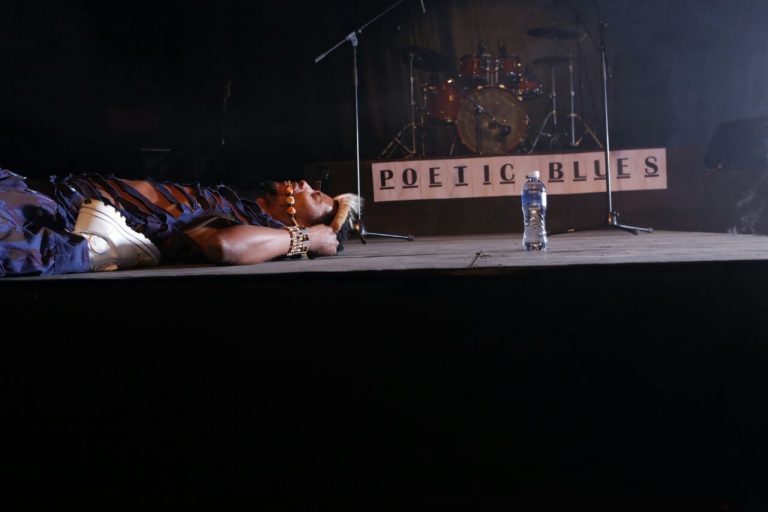More Music, Less Blues

For a third year running, the Andre Huguenet Theatre hosted Nthabiseng JahRose Jafta’s poetry and music cocktail, Poetic Blues.
The show brought together Mangaung’s art patrons in a festival of word and sound – the latter rendered majestically by On Point Music.
A lot was familiar about this year’s show compared to other years’ offerings. The stage setting was almost identical to the previous instalments and the line-up boasted some names long-time patrons have become accustomed to. Prior to the show, organiser JahRose mingled with the ever growing crowd, taking an opportunity to share a smile and a selfie, as people walked around to view displayed DVDs and books.
The DVD of last year’s showcase was played in the foyer after JahRose, her friend and sister Charmaine Mrwebi, and their little brother Preacher Technique welcomed the obviously excited audience.
The MC of the evening was Nitro, who took to the stage with cue cards, and ran through the house rules: be quiet, applaud and enjoy yourself.
The first commandment was torn asunder as early as the second act, which was a reading of an erotica in impeccable Sesotho by Art State’s very own Ace Moloi. He had the crowd speaking in tongues as he painted a vivid sensual scene, mixing things up with some holy language.
In the calm stepped in Mangaung poetry legend Serame “Icebound” Makhele with his two-man basking band Moribo wa Mangaung. As elders are wont, Icebound brought his cool to lament on the state of heartless art and artists too concerned with crashing heads of weed and blowing smoke of confusion. He dared disappoint Don Mattera telling him not to hold his breath waiting for freedom to walk the earth as it is twisting and turning in a frozen casket. He also however showed his softer side; roping in the ever effervescent Hape “Black Rose” Mokhele on stage to be the object of his charms as he and Moribo chanted, “Hela, mose o mofubedu.”
Sasa Jobodwana on vocals and David on guitar hypnotised the masses with their original compositions, reminding all and sundry that dreams shape the foundation for tomorrow. Charmaine brought such dreams – albeit scary ones – with her rendition of her classic poem, Gangster Nyatsi, wherein she vows her devotion to her husband’s mistress.
Hector “The Khanga Taker” Kunene (pictured) would not let the theatre get away without being subjected to theatrics, rendering a piece imploring one to unmask their face; all we see of him is a silhouette behind a screen, two violinists – twins – alone on stage providing a haunting melody to his poem. When he does unmask himself, a self-flagellating cheat is revealed, actor and poet Mlu walks around the stage in robes wielding a sjambok playing the super-ego of the man who has narcissistically turned the tables to make the pain he’s caused his lover to be all about him.
More dramatic poetry follows as Preacher Technique, the penultimate poetry performer, rears all the anger he can muster to the stage. It bubbles and boils over such that he does not wait to reach the stage to let rip his rage. His body shakes and convulses as he spits volcanic venom.
On Point joins JahRose as she starts the headline act in song. Sweet, slow, sensuous are her words and voice. Measured, skilful, complimentary is On Point’s music. Only three pieces in she announces that she is about to give her swan song. Her loyal fans do not wait to hear what that will be. “Kgosatsana!” they demand. The Igbo of old hold that no one has ever gone to court against their own people and won. Nthabiseng – maybe as a nod to those who named her such – pleases the patrons by announcing that indeed it will be Kgosatsana that she will close with. Many get on their feet and sing along with her as she and her band have tremendous fun with the hit.
It is left to On Point and Thaba Nchu crooner John “Igwe” Paka to take all of us home – and do so on time. But church is the first stop, and church hardly stops. Paka goes through a litany of popular hymns, even adding a ragga feel with Deda jumping in to render a slightly, if not aptly modified, Lord’s Prayer of the Father who arts in Zion.
Eventually Paka remembers that people have lives to lead beyond the reach of his voice.
To see the crowd milling about sometimes even aimlessly in the foyer after the four-hour show is only testament to the engagement they had with the artists who took to stage. The artists themselves all came out to meet and greet their doting fans – old and newly acquired.
Music was aplenty, as was the poetry – fortunately the only thing missing were the blues.
Photo credits: Tank Khumalo